Table of Contents
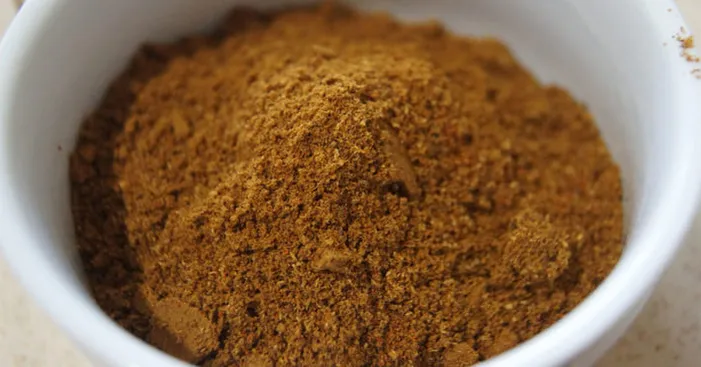
Ground cloves are one of the most fragrant spices used in many culinary recipes and infusions worldwide.
This brown powder is full of nutrients and has extraordinary antioxidant properties beneficial for our health.
In this article, we gathered all the information you need to learn about ground cloves including a historical overview of cloves, nutritional values, health benefits, and the possible side effects of cloves alongside tips on how to buy + use + store them.
What are cloves?

Cloves are technically the dried flower buds of a tropical tree called Syzygium aromaticum.
This tree belongs to the Myrtaceae family which makes it related to Eucalyptus and Eugenia.
These trees are native to Indonesia thanks to its perfect tropical weather which provides both warmth and humidity.
The flower buds of this tree are harvested during December then they are put to dry within 5 days on mats under the sunlight.
Once they’re dried, they gain a darkish red color and they become harder.
Cloves contain a good amount of essential oils (about 20%) such as Eugenol which is the agent responsible for the smell and the spicy taste.
Ground cloves is a brownish fragrant powder rich in antimicrobial and antioxidant content which is often used in recipes, pharmaceuticals, and perfumery.
Historical overview
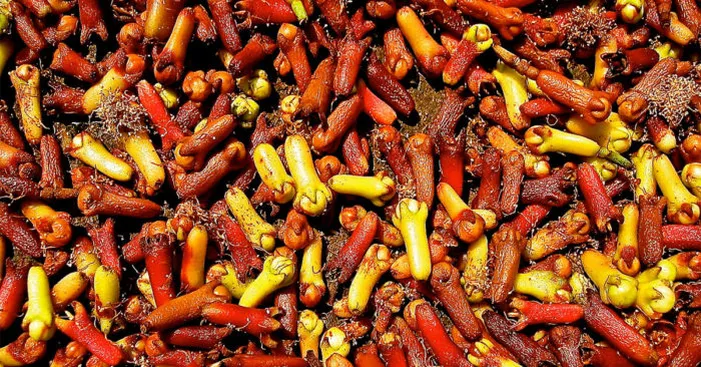
There is an Indian text that dates back 2000 years ago and it says “put nutmeg and cloves in the mouth to keep fragrant and fresh breath”.
Clove trades date back to the Sanskrit age, 3rd century BC, as it was mentioned in the Ramayana epics.
A few miles to the East, cloves were widely used for their medicinal properties since the Han dynasty.
In fact, those from the general public who wanted to meet the emperor were required to have some cloves in their mouths to purify their breath.
In the beginning, the Chinese bought cloves from the Eastern parts of India and they believed that it comes from islands months away by ship.
Several decades later, Arabs started trading with Indians and Chinese that’s when they transported cloves to the Syrian markets.
Middle Easterns used to ground cloves and mix them with other ingredients to make homemade mascara they called “Kohl”.
However, after being a common ingredient all across the Middle East, it reached Rome where it was highly praised.
In fact, cloves were very expensive since they only existed in powder form across Rome and the Middle East, and no one knew their origin.
Nowadays, clove is cheaper than how it used to be, but it is still one of the most expensive spices worldwide.
Ground cloves nutritional values and health benefits:
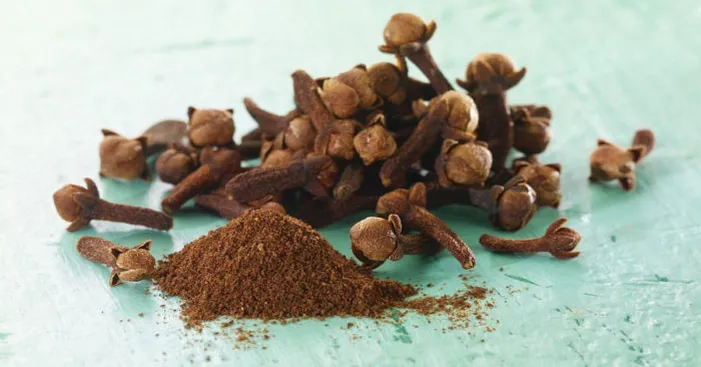
Nutritional values:
These data counts for 1 tbsp. (6.5g) of fresh ground cloves:

- Calories: 18
- Protein: 0.4g
- Carbs: 4.3g
- Dietary fibers: 2.2g
- Fats: 0.8g
- E vitamin: 4%
- K vitamin: 8%
- B1 vitamin: 1%
- B3 vitamin: 1%
- B6 vitamin: 1%
- Calcium: 3%
- Copper: 2%
- Zinc: 1%
- Manganese: 170%
- Iron: 4%
- Magnesium: 4%
- Potassium: 1%
Health benefits:
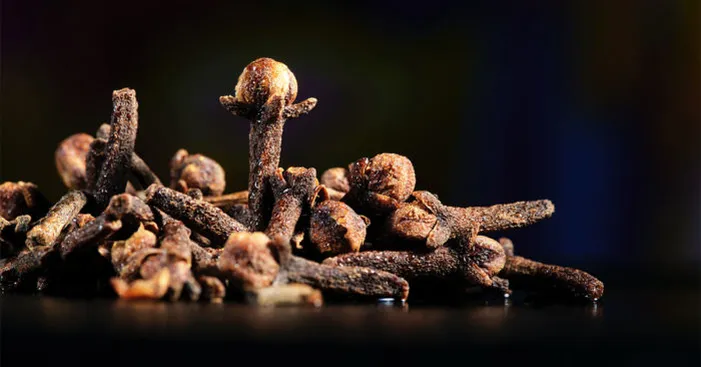
Improves liver health:
Ground cloves are full of beneficial nutrients that can enhance your liver health.
For instance, cloves are a great source of eugenol AKA “clove oil” which is good for the liver.
An animal study on rats investigated the effect of eugenol on reduced inflammation and improved liver function.
Also, other studies confirmed that clove oil improved liver function by reducing the risk of liver scarring.
In addition, a human liver study found that consuming eugenol for 7 days actually decreased glutathione-S-transferases (GST) levels.
This family of enzymes is responsible for detoxification which makes them the indicators of liver disease.
In other words, the more toxins the liver needs to detoxify the more GST enzymes it needs that’s what makes their levels go high.
Nonetheless, even though there are some pieces of research we still need more to confirm the effect of eugenol on the human liver.
This could be due to the fact that cloves are full of antioxidants like vitamin E and eugenol which promotes liver protection.
Helps digestion:
One of the most painful stomach diseases is because of peptic ulcers, which are painful sores forming on the stomach wall.
These abnormalities are often the result of infection, stress, or simply genetics which can all be treated with cloves.
In fact, animal studies prove that clove essential oils increase the production of digestive liquids like gastric mucosa.
These liquids protect the stomach walls from the acidity of the digestive acids therefore cloves are beneficial for the stomach.
Other studies also prove that clove components have the same effect on stomach ulcers as many other anti-ulcers drugs.
Regulates blood sugar levels:
One of the other beneficial things about cloves is that they can help the body regulate its blood sugar levels.
Not only do cloves help control blood sugar levels but they can also prevent diabetes.
In fact, a study on 13 patients who took clove extracts daily for 30 days showed that these patients had lower blood sugar levels.
The patients had a 27% reduction in blood sugar levels compared to what they had before the test.
In addition, another study on diabetic rats shows that clove extract was able to enhance the function of the cells that produce insulin.
As you may know, insulin naturally helps our bodies have control over blood sugar levels.
However, diabetic patients usually have high levels of insulin which makes their bodies unable to know how much sugar they need.
Consuming ground cloves or whole cloves regularly can help maintain insulin levels which will regulate blood sugar levels accordingly.
Promotes bone health:
Over 50 million Americans suffer from low bone density or osteoporosis and that is 15% of the entire American population.
This means that a huge number of Americans are at a high risk of bone fractures and breaks.
Some studies show that the nutrients in cloves could help preserve bone mass.
Cloves are a great source of manganese, with more than 25% of the daily needs in just 1 tsp of ground cloves.
This is the mineral responsible for connective tissue formation including bones and teeth.
There are very limited studies about the effect of clove on bone mass but animal studies seem very promising.
Great antimicrobial properties:
Cloves have a very unique aroma and that is because of the presence of eugenol.
Many pieces of research show that cloves have strong antimicrobial properties as they can eliminate bacteria.
For instance, clove essential oil was found to be able to eradicate bacteria like E.coli which is found in contaminated food.
This can be very helpful, especially for oral health where cloves are most used in modern drugs and ancient alternative medicine.
For instance, scientists have proven that cloves are able to stop the growth of a couple of bacteria that cause gum disease.
Another study on 40 people who used clove mouthwashes shows that they had healthier gums and less amount of plaque.
By boiling water and then infusing 2 to 4 teaspoons of ground cloves, you can have an effective natural mouthwash to use for days.
Other health benefits:
- Able to prevent cancer.
- Treats erectile dysfunction.
- Boosts immunity.
- Good for the cardiovascular system.
- Reduces the risk of heart disease.
- Good for the hair.
- Relieves stress and insomnia.
Precautions before you consume ground cloves:

Ground cloves offer an abundance of antioxidants and nutrients, however, they can cause some side effects in some cases.
The spice contains about 20% of oils whereas eugenol makes the most of that, therefore it can be harmful to some people.
For instance, people who suffer from high blood pressure need to avoid consuming cloves, at least not before consulting their doctor.
Clove extracts, especially concentrated oils can burn and irritate the skin in the same way cinnamon oil would.
To avoid overconsuming ground cloves or whole cloves make sure you:
- Do not take more than 8 cloves per day.
- Avoid Drinking more than 3 cups of cloves infusion per day.
- Do not consume cloves daily for more than 7 days.
The last precaution is because overuse of cloves can lead to side effects on the digestive system, nervous system, and even the liver.
The symptoms of the overuse of cloves can manifest in many ways including:
- Nausea and vomiting.
- Diarrhea.
- Burning sensations.
In addition, if you’re using clove oil make sure you always dilute it with vegetable oils (like olive oil).
Nonetheless, some groups of people should avoid clove at all costs because of the lack of scientific research.
For instance, children (under 10 years of age), and pregnant & breastfeeding women should avoid the therapeutic use of cloves.
This is mostly because of the abundance of eugenol which can be harmful in high doses for these groups of people.
However, many kinds of toothpaste and mouthwashes use clove because of its efficiency against toothache and gum bacteria.
In other words, the culinary use of cloves causes no harm to any group of people but with therapeutic use, such people should consult a doctor first.
Consuming cloves:
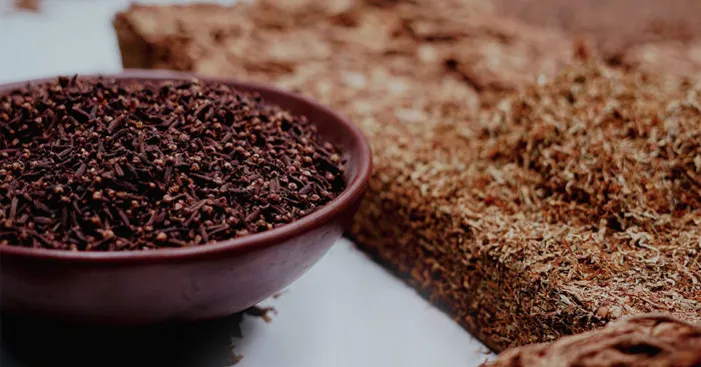
This spice has a very strong aroma that can easily overpower your dish so you need to know how to use it.
On the nutritional level, the maximum recommended safe dose of ground cloves shouldn’t be more than 1tbsp (6.5g) per day.
For instance, a general rule to follow is to add about 8 cloves (1 tsp of ground cloves) when you are making a savory recipe.
However, when using cloves in pastries and drinks you wouldn’t need more than 1 tsp.
Cloves combine really well with nutmeg and cinnamon, especially ground cloves they can be used in many dishes including:
- Roasted meat.
- Broths and stews.
- Marinades.
- Vinegar.
- Jams and pies.
- Wine drinks.
- Cookies and bread.
Buying cloves:
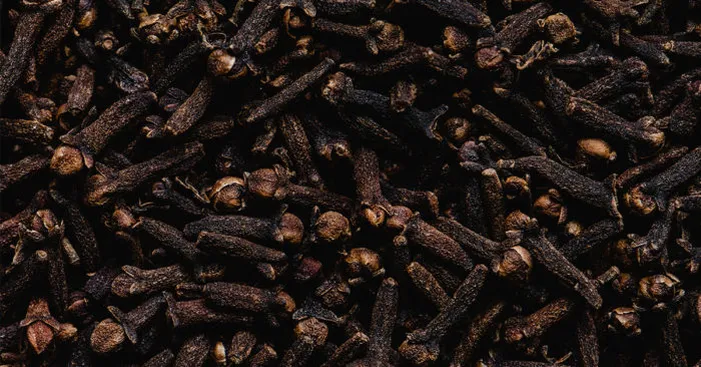
You can find whole and ground cloves in the market and each of them has its own shelf life.
If you are buying whole cloves, choose the ones with stems and head intact, brown in color, from Madagascar preferably.
Even if you want ground cloves, the best choice is to buy whole cloves as they have a longer lifespan.
You can grind whole cloves to obtain a fresh powder that still contains the most nutrients whenever you want to.
The powdered version of cloves is usually used as a spice to make it blend easily with other ingredients.
However, there are other criteria that could help you determine the quality of the clove:
- Appearance:
A clove is composed of two parts: the head and the stem so make sure you’re not buying stems without heads as they have a lower nutritional profile. - Freshness:
Whole cloves can hold on to their nutritional composition for a couple of years, unlike ground cloves which lose their nutrients in a couple of months.
You can test the freshness of whole cloves by putting them in water: if they float they are still fresh and if they sink then they’re old. - Color:
Brown cloves with shades of red means they are fresh and as time goes by they get darker and darker until they become black. - Origin:
Buying cloves from their original countries would ensure their quality so look for cloves from Madagascar, Sri Lanka, Malaysia, and Indonesia. - Size:
Large cloves mean better quality so try to avoid buying small cloves.
Storing ground cloves:
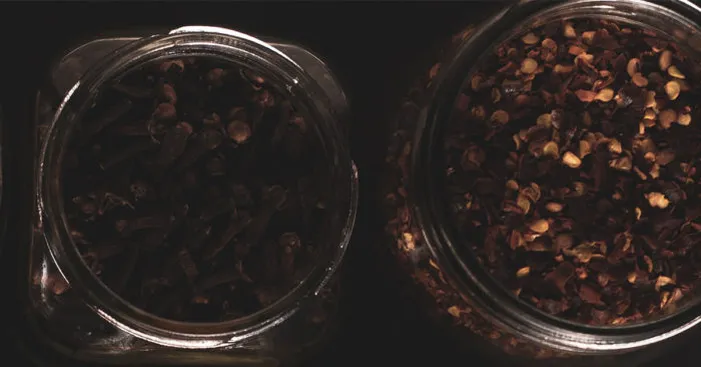
You can store ground cloves for several months if you store them under the right conditions.
This spice should be kept away from light, heat, and moisture especially after making it into a powder.
Cloves do not expire which is a good thing and it means that they won’t develop fungus or mold over time.
However, they would lose much of their nutrients as they go old which takes away all of their health virtues.
You should know that the spiciness of cloves comes from the presence of their nutrients, such as eugenol, which gets lost over time.
Thus, to know if a clove is fresh or not you can simply taste it and see how strong is the aroma to know if it’s old or not.
In case you bought ground cloves, do the same, taste some of it and if it tastes strong then it’s fresh, if it tastes blunt then it is old.
Whether you’re storing ground cloves or whole cloves, try to keep them away from light, heat, and moisture.
To do that the best way possible, put them in a sealed glass jar (dark preferably) and a dark place like a kitchen pantry away from heat.
